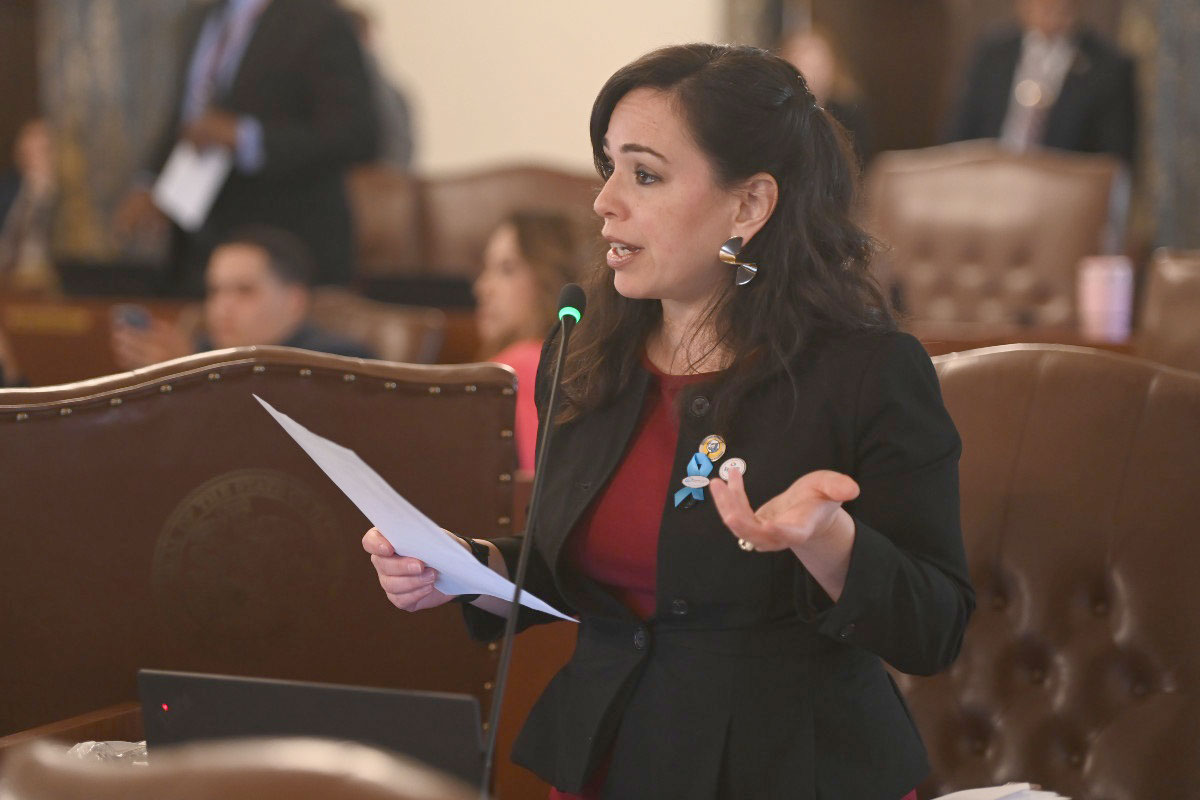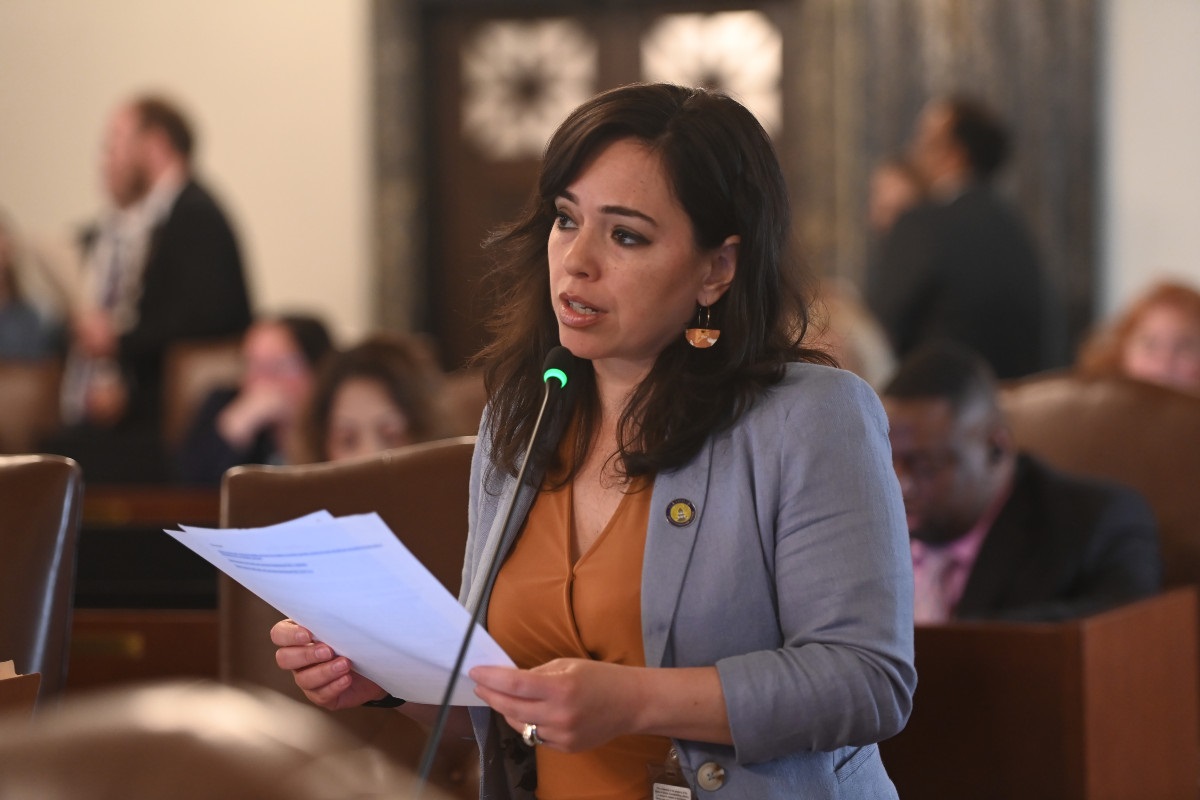- Details
- Category: Senator Cristina Pacione-Zayas News
 SPRINGFIELD – To ensure people of all genders have access to the health care they need, Senator Pacione-Zayas’ new legislation will remove gendered restrictions in insurance codes regarding coverage of pap smears or prostate exams.
SPRINGFIELD – To ensure people of all genders have access to the health care they need, Senator Pacione-Zayas’ new legislation will remove gendered restrictions in insurance codes regarding coverage of pap smears or prostate exams.
“Transgender and gender non-conforming people have historically struggled with accessing health care, which has led to adverse health effects. Making language in the insurance code gender inclusive, rather than gender specific, removes barriers to accessing care aligned with people’s biology versus gender identity and lowers the risk of denial of care reported by transgender individuals,” Pacione-Zayas (D-Chicago) said. “The Trans and gender non-conforming community already faces myriad obstacles to basic services. This legislation is a small but important step in correcting this longtime shortcoming of our healthcare system that prevents too many from getting the live-saving care they need.”
The current Illinois insurance code is gender-specific, meaning patients who are listed as female or male can only be covered for pap smears or prostate exams respectively. This specificity prevents many patients from getting the care they need if they are not registered as the same gender as they were assigned at birth. With these restrictions, patients may not be able to access necessary cancer screenings without incurring massive out-of-pocket costs.
House Bill 2350 would make the insurance code gender-inclusive rather than gender-specific, removing barriers to accessing care aligned with people’s biology versus gender identity and lowers the risk of denial of care reported by transgender individuals. Additionally, this initiative would require prostate screenings for people 40 years and older who have a genetic predisposition to prostate cancer, which would ensure that insurance covers important preventative treatment.
This issue was highlighted in the Reproductive Justice working group in response to the Dobbs decision by State Representative Kelly Cassidy, who was the House sponsor of the bill.
“Early detection and prevention are key to saving lives,” said State Representative Kelly Cassidy (D-Chicago). “We should remove any barriers we can identify that prevent people from getting the care that they need, in particular barriers that impact vulnerable populations like the trans community.”
House Bill 2350 passed the Senate on May 4.
- Details
- Category: Senator Cristina Pacione-Zayas News

SPRINGFIELD – After the Higher Education in Prison Task Force conducted a yearlong analysis of the current higher education opportunities for people who are incarcerated, Task Force members State Senator Cristina H. Pacione-Zayas and State Representative Carol Ammons have proposed changes based on the results of the study to improve educational opportunities for people who are incarcerated.
“It can be challenging for people who are incarcerated to come back to their communities or find work after serving time,” said Pacione-Zayas (D-Chicago). “Offering college courses or a path to get a degree while in prison can ease this transition and promote rehabilitation instead of punishment. However, there needs to be more transparency and accountability for these programs as reports have demonstrated they are not accessible to folks who are qualified.”
Over the past year, the Illinois Higher Education in Prison Task Force has been analyzing the existing state of higher education programs for people who are incarcerated. This study assessed barriers and opportunities potential students may face, and used evidence gathered to propose ways existing programs can be improved to better support people seeking further education.
- Details
- Category: Senator Cristina Pacione-Zayas News

SPRINGFIELD— Prospective employees may soon have access to increased salary transparency from potential employers, thanks to a new measure led by State Senator Cristina Pacione-Zayas (D-Chicago) and State Representative Mary Beth Canty (D-Arlington Heights).
“Wages and benefits determine how much food caregivers can bring to the table and if they can afford essential health care treatment and other necessary costs that determine a family’s quality of life,” said Pacione-Zayas (D-Chicago). “Transparency is essential to ensure employees are not misled when accepting a role with wages that cannot support them or their family.”
To ensure prospective employees have access to all information on their potential earnings and benefits when determining if they should accept a job, this initiative would require employers with 15 or more employees to publicly post the wage or salary and description of benefits offered for a job, promotion, transfer or other employment opportunity. It also requires employers to provide employees their current wage or salary range along with a general description of benefits upon that employee's hiring, promotion or transfer, upon the employee's request.
Read more: Pacione-Zayas, Canty Pass Bill to Increase Salary Transparency
- Details
- Category: Senator Cristina Pacione-Zayas News
 SPRINGFIELD – Freelance workers may soon have legal protections requiring them to be paid in a timely manner and transparency measures that are designed to ensure fair labor practices, thanks to an initiative sponsored by State Senator Cristina H. Pacione-Zayas.
SPRINGFIELD – Freelance workers may soon have legal protections requiring them to be paid in a timely manner and transparency measures that are designed to ensure fair labor practices, thanks to an initiative sponsored by State Senator Cristina H. Pacione-Zayas.
“Freelance workers deserve the same dignity other workers receive, including being offered the basic respect of timely compensation for their labor,” said Pacione-Zayas (D-Chicago). “This measure would ensure all workers are paid what they are owed quickly so they can support themselves and their loved ones.”
Freelance workers are people hired as independent contractors to provide products or services for a contracting entity, earning at least $500 for their labor. Because they have a different contract than salaried or hourly workers, the entities that hire them are not held to the same legal requirements as with other employees. This has led to many freelance workers being paid much later for their work than they had been promised, as well as being offered to take a pay cut to get any wages for their labor sooner.
Read more: Pacione-Zayas advocates for freelance workers’ rights and protections
- Details
- Category: Senator Cristina Pacione-Zayas News

SPRINGFIELD – Dual language education may soon be more accessible to Illinois students, thanks to a new measure sponsored by State Senator Cristina H. Pacione-Zayas.
“Dual language instruction can be transformative for a student, expanding their future career opportunities and strengthening their connection to their culture and develop a global view,” said Pacione-Zayas (D-Chicago). “Improving our dual language offerings will help young people become more well-rounded and have a better understanding of themselves and the world.”
Currently, Illinois supports bilingual education programs by maintaining an advisory council on bilingual education, which reports to the Illinois State Board of Education. However, this council is only required to provide recommendations to best support students and families participating in ESL, or English as a Second Language. While these recommendations are important, this council could use its insights — as an important table of academics with expertise in various programs of bilingual education — to also study dual language instruction across the state and provide recommendations on how to support these programs.
Read more: Pacione-Zayas to expand and improve dual language instruction in schools
- Details
- Category: Senator Cristina Pacione-Zayas News

SPRINGFIELD – In collaboration with a 20th district constituent, a new initiative led by State Senator Cristina H. Pacione-Zayas to connect more children with intellectual or developmental disabilities to essential supports has just passed the Senate, making it one step closer to becoming law.
“When caregivers find out about the resources available from the PUNS database, they are often frustrated before feeling relieved, as they could have sought access for the necessary supports to improve their child’s quality of life if this program had been better publicized,” said Pacione-Zayas (D-Chicago). “Our goal with this legislation is to prevent further miscommunications or frustration and simply connect caregivers to helpful resources as soon as possible.”
The Prioritization of Urgency of Need for Services (PUNS) database is a statewide database maintained by the Illinois Department of Human Services that records information about individuals with intellectual and developmental disabilities potentially in need of services. The PUNS database is available to all children and adults with intellectual and developmental disabilities who have unmet services needs anticipated within the next five years.
- Details
- Category: Senator Cristina Pacione-Zayas News

SPRINGFIELD – Home visiting is an essential program in the early childhood ecosystem that helps eligible parents and caregivers support their child’s development from the prenatal phase through age five. A legislative initiative introduced by State Senator Cristina H. Pacione-Zayas, which would codify home visiting programs administered by the Department of Human Services as they have done for over 30 years, passed through the Senate on Wednesday, March 29.
“All parents want to provide the best environment in which to raise their child, but the resources needed to best support their children may be inaccessible for many caregivers,” said Pacione-Zayas (D-Chicago). “Home visiting programs help connect families to community resources that can provide the support their children need to succeed, while also prioritizing greater family stability.”
Typical home visits involve in-person interviews with family members and caregivers, guidance on promoting safety in the family’s living space and coaching on approaches to parenting that promote healthy development.
Read more: Pacione-Zayas DHS home visiting program legislation passes Senate
- Details
- Category: Senator Cristina Pacione-Zayas News
 SPRINGFIELD – On Wednesday, the House Child Care Access & Early Childhood and Senate Early Childhood Education Committees held a joint subject matter hearing to discuss public resources that support optimal development for infants and toddlers from the prenatal period to age three. Building on the first subject matter hearing that made the case for investing in the early years, the testimony highlighted the intent of programs and services, demographics of participants, specific considerations for young children with developmental delays and disabilities and multilingual learners, gaps in services, and the expected impact of increased investments.
SPRINGFIELD – On Wednesday, the House Child Care Access & Early Childhood and Senate Early Childhood Education Committees held a joint subject matter hearing to discuss public resources that support optimal development for infants and toddlers from the prenatal period to age three. Building on the first subject matter hearing that made the case for investing in the early years, the testimony highlighted the intent of programs and services, demographics of participants, specific considerations for young children with developmental delays and disabilities and multilingual learners, gaps in services, and the expected impact of increased investments.
More Articles …
- Pacione-Zayas encourages expansion of community schools
- Pacione-Zayas initiative ensures sustainability and expansion of DHS home visiting programs
- Pacione-Zayas appointed chair of newly formed Senate Early Childhood Committee
- Pacione-Zayas legislation creates transparency to administrative hiring process in Chicago Public Schools
Page 1 of 9













 © 2026 Illinois Senate Democratic Caucus
© 2026 Illinois Senate Democratic Caucus